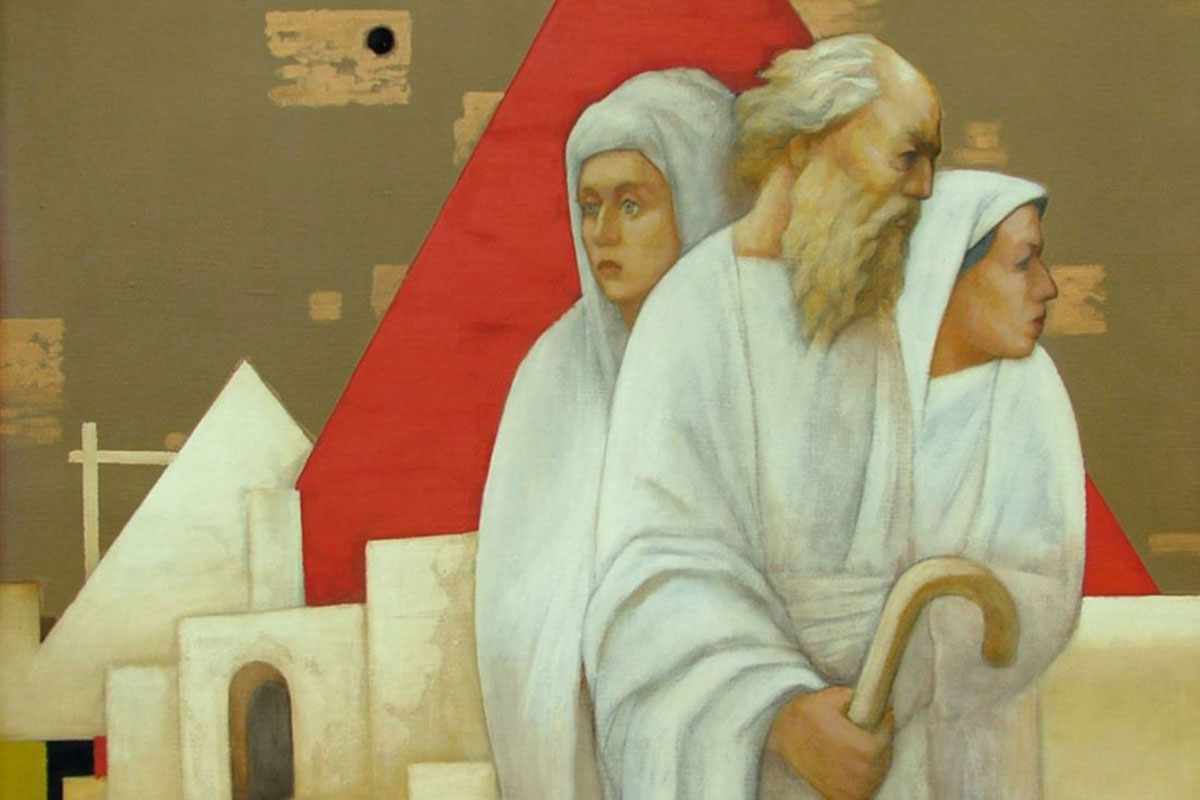Were not the Jews themselves the first exponents of racial doctrine? Do not we read in the Bible of one blessing, reserved to them, and of curses directed against other races as such? We must therefore reconsider the racial pronouncements of the Scriptures and the element of racism in the phenomenon of Israel as a “chosen people.”
One point is clear at the outset: the election was certainly that of a people, but neither in the content nor in the significance of God‘s choice was there any element of racism. It is noteworthy that the religion of Israel differs profoundly from that of other peoples of the same racial community, which makes the Nazi proposition of a close link and an exact correspondence between race and religion pure invention. Israel was chosen as a people because God’s purpose is to unite all men in a single spiritual people, the Church, to save them and lead them to communion with him, not in isolation but as a community. Israel was thus chosen for and on behalf of all, pars pro toto. If the choice fell, in the first place, upon one people alone, it was because it is apparently God’s pleasure to give first to one or to a few what he intends for all, so that men’s efforts and advances throughout history may become a part of his scheme of universal mercy. It was also in order to shelter the newly planted seed of true religion and to protect the young plant before it was exposed to all the winds of the world‘s civilization.
That there was no racist significance in God’s choice that the Bible, when it talks of a “chosen people”, has no thought of a superior race or a Herrenvolk—is clearly and explicitly stated. We are told, in fact, that Israel was chosen not because of any superior qualities—how much the Greeks excelled the Jews in that respect!—but precisely because they had no such qualities (see: Deut 7:7; see also: Deut 10:14-15, Ezek 16:3-15, 1 Cor. 1:27). This significance of Divine election is brought out in all the books of the Bible by the fact that God constantly reverses relative positions, choosing the younger in place of the elder—as in the stories of Cain and Abel, Jacob and Esau, Ephraim and Manasseh, and David—or taking barren women for the mothers of the chief of the elect among His people—as Sarah, Rebecca, Samson’s mother, Hannah the mother of Samuel, Elizabeth the mother of John the Baptist. Thus the “chosen people” does not mean a privileged, exceptionally gifted race; there is no idea of racism in the choice of God’s people.
Nor is there any idea of racism in the content of the election. Throughout, from the very beginning, Israel is chosen for all mankind, to be the medium of a Revelation designed for all. The idea of God which emerges from the Bible differs profoundly from that found among all the other peoples surrounding the Israel of those times, in that Yahweh is not the god of a particular people, associated, like the particular gods, with a given group of men. He is the Creator of all things; there are no other gods beside him. That, too, is why he is not bound to a particular place, such as a mountain, a spring, or a sanctuary. This point is very clearly brought out by Stephen, in his speech before the Sanhedrin, and by Paul, in his speech before the Areopagus (see: Acts 7; 17). This gives us a clearer understanding of the meaning of the two passages in which the Bible speaks of the division of the races, i.e. the generations of Noah, leading on to the story of the Tower of Babel (Gen 10:1; 11:5). The author of a recent study on the story of the Creation, M. W. Zimmerli notes that the two stories are complementary. The story which explains the diversity of the peoples descended from Noah shows us the happy, positive aspect of that diversity. Happy is the man who has many descendants. There is nothing in the Bible reflecting on Blacks as the “accursed sons of Ham”; the theocratic writers who, like Joseph de Maistre, claimed to know, from the Bible, what was God‘s opinion of the history of their times, and above all those who, like some British and American writers of the eighteenth and nineteenth centuries, used the Bible to justify the slave-trade, were guilty of a complete misinterpretation and read into Holy Writ something which was never there at all. There is in the Scriptures no curse pronounced against any race, as such.
From the standpoint of biblical Revelation, it is natural for mankind to be one or, at all events, to live together in peace and harmony. If diversity among men leads to conflict and impossibility of agreement, it is something unnatural for which an explanation must be found. The Bible explains it by the etiological account of the Tower of Babel, which shows the harmful aspect of the diversity—in itself neither good nor bad but, on the whole, fortunate in its effects—between races, peoples and languages. From the story itself, the racial, political and linguistic unity of mankind is not, in itself, reprehensible. God opposes that unity only when it inspires the presumptuous ambition of eluding his sovereignty. E. Konig, who has brought this out clearly, also notes that no other ancient literature lays so much stress as the Bible upon the unity of mankind. He shows that, from the creation of Adam onwards, the Bible contemplates a plan on the part of God, and a history of salvation, for the whole of humanity. Even after the fall, God refrains from destroying man; he has given him pledges of his love, certain means of knowing him; he has, as it were, entered into a compact with mankind to show man mercy and endow him with the gifts of nature. Even when the pride of men has drawn upon them the curse of Babel, God, though transferring his plan of grace to one family and one people, by the election of Abraham, does not fail to announce explicitly, from the beginning, the universalist purpose of what he is doing: “In thee shall all families of the earth be blessed.”
This universalist design is never entirely lacking in the history of Israel. Before the Gentiles entered the Church and the confusion of Babel was made good by the miracle of Pentecost, there was a sort of anticipation and pledge of universal salvation, an assimilation to God’s people of individuals of different ethnic stocks—Rahab, the harlot of Jericho; Abimelech, the son of Gideon and a Canaanitish woman; Ruth the Moabitess, who was one of the ancestors of Jesus; and the great anonymous multitude of those who were admitted to the religious communion of Israel as proselytes (a word which, it may be said in passing, is peculiar to biblical language—a fact not without significance; see: Exod 12:48-49). It is impossible, in this context, to omit mention of the splendid expressions of the universalist outlook which are to be found, in numbers, in the Psalms and the Prophets from the time of the Exile onwards. We cannot quote them here, but they should be re-read in Isaiah 11: 9; 15: 1-2; 19: 19-25; 49: 18-23; 52: 10 et seq.; 56: 1-8; 8-11; Psalm 2:7-8; 22:27-28; 65:1-2; 67:1-2; 72:8-11; 86: 8-10; 96:5, 7, 10; 98:6-7; Zech 2:11-13; 8:20-23; 14:20-21; Joel 3:1-2; Malachi 1:11; etc. So far as the Bible is concerned, all the peoples are at fault, but they are all covered by God’s forgiveness and they shall all come to him.
However, there are also in the Scriptures commandments to destroy members of other races, or indeed to destroy those races in general. In the thousand years that elapsed between the command to destroy the Midianites, the Canaanites, etc. of which we read in the Book of Numbers, Deuteronomy or Joshua, and the somewhat similar measures taken by Ezra after the ExiIe, much blood was shed. But it is clear, and indeed stated explicitly in the Bible, that strange peoples and strange wives were never condemned to destruction as a result of race discrimination as such, but were so condemned because of the danger or the actual commission of idolatry (see: Numbers 25:5; Deut. 9:4: Ezra 9:1 et seq.). Nor was it racial prejudice, as such, which inspired so many of the measures for the protection of the line of the Patriarchs, and later of that of Judah, but rather the desire to remain pure for the carrying out of God’s purpose, which was, from Abraham to Mary, through Judah and David, to fulfill the messianic promises.
There could thus be no greater error than to interpret the Old Testament in terms of race and, more especially, of racism. Even after the rise of Christianity, Judaism, scattered but still indivisible, never gave a racist interpretation of its position. There may have been a spontaneous tendency in that direction among the people, and that tendency may have been strengthened to the extent that the Jews themselves secularized the idea of their people and, to use the terms we explained above, became “Jews” rather than “Israelites”. In some parts of the Talmud itself, universalism is, here and there, practically abandoned and God’s choice is regarded as the choice of Israel for its own sake rather than for all mankind. That is not enough to constitute racism. On the other hand, no one was ever definitively excluded from the community of Israel on the ground that he was not descended, after the flesh, from Abraham. Not only individuals of Aryan stock but entire ethnic groups have been received into that community (e.g. the Chazars from south of the Volga, from the ninth to the eleventh centuries, when they were destroyed; or the Judaized Berbers of North Africa). It often happens, however, that when a given group is treated on a race basis the group itself grows racially conscious, and reacts accordingly; examples of this are to be found among Blacks in more than one part of Africa. The Jews probably followed a similar line of development here and there. If this is true, they would not, at all events, have been the first exponents of a racist doctrine.
EDITORIAL STATEMENT: This is an excerpt from the 1953 booklet The Catholic Church and the Race Question (click the title for the full text), published here by kind permission of the UNESCO Digital Library, all rights reserved.


